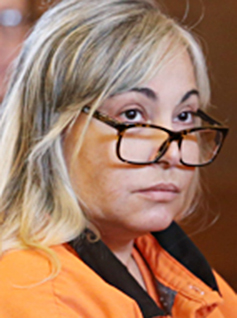UPDATE | Hoerig wants charges dismissed in death of her husband

Claudia Hoerig
WARREN
There was discussion during today's hearing for aggravated-murder defendant Claudia Hoerig that charges against her be dismissed based on the length of time it has taken to bring her to trial.
Judge Andrew Logan of Trumbull County Common Pleas Court set a hearing for 9 a.m. March 15 to argue the motion and to hear testimony if necessary.
There also was discussion today about whether Hoerig will allow her case to be tried later than the April 16 trial date set earlier this month.
Judge Logan conferred with her attorneys but they are not at this time asking for her April 16 trial date to be moved back. The outcome of the March 15 hearing might affect that.
Hoerig, 53, charged with killing her husband, Karl Hoerig, in their Newton Falls home in March 2007, has been back in the United States since Jan. 17, after nearly 11 years of work by Trumbull County Prosecutor Dennis Watkins and others to return her from her native Brazil, to which she fled after her husband's death.
Her trial was set for April 16 because Ohio law requires her to tried within 90 days of her arrest unless she waives that right.
On Friday, her attorneys with the Ohio Public Defender's Office sought to have charges against her dismissed based on their interpretation of her rights to have a speedy trial.
The filing says Claudia Hoerig was arrested April 20, 2016, in Brazil, and has been incarcerated since then. They argue that the clock on her 90 days should have begun then, not this January.
"Given the lengthy delay in this case, [Hoerig] respectfully submits that her statutory speedy trial rights were violated and her case must be dismissed," the filing says.
It notes that she was willing to go to trial in Brazil as early as 2013, but prosecutors refused to prosecute her in Brazil.
The filing says prosecutors have made some attempt in a recent filing to detail the efforts they made to bring Claudia Hoerig back to Trumbull County, "but the 10-year delay since indictment and 22-month period of incarceration suggest those efforts were either minimal or met with resistance by Brazilian officials, all beyond the control of the defendant."
 43
43
